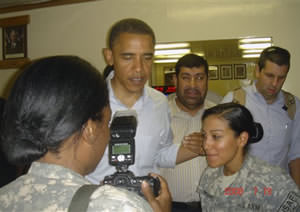Obama Begins World Tour
Barack Obama embarked on his international diplomacy tour -- a key step in raising his profile on the world stage and demonstrating his readiness to take over the American presidency -- with an important first major stop. The Illinois senator landed in Kabul, Afghanistan, on Saturday as part of congressional delegation surveying the current situation in that troubled nation.
Barack Obama embarked on his international diplomacy tour — a key step in raising his profile on the world stage and demonstrating his readiness to take over the American presidency — with an important first major stop. The Illinois senator landed in Kabul, Afghanistan, on Saturday as part of congressional delegation surveying the current situation in that troubled nation. The presumptive Democratic nominee also will visit Iraq, Jordan, Israel, Germany, France and England.
Meanwhile, John McCain was on the offensive back in the U.S., criticizing Obama for his more pessimistic take on the American troop surge in Iraq and casting him as inexperienced and out of touch.
Your support matters…The Swamp:
McCain, an Arizona senator, has visited Afghanistan four times and Iraq eight times since 2000. McCain, who has made national security and foreign policy the centerpiece of his campaign, has criticized Obama for calling for a 16-month timetable for withdrawal before meeting with troops and commanders in Iraq.
“When a further conditions-based withdrawal of U.S. forces is possible, it will be because we and our Iraqi partners built on the successes of the surge strategy, which Senator Obama opposed, predicted would fail, voted against and campaigned against in the primary,” McCain said in a statement Friday.
But McCain, like Obama, has also called for more attention on Afghanistan.
Obama has said the U.S. should start pulling troops from Iraq and instead focus on militants in Afghanistan and neighboring Pakistan, where Osama bin Laden and other Al Qaeda leaders are thought to be hiding. In a far-reaching speech Tuesday, Obama said he wants to draw down U.S. troops in Iraq, end the war there responsibly and send two more brigades, or about 7,000 troops, to Afghanistan.
Obama also said he wanted to take the fight to Al Qaeda in Afghanistan and Pakistan, saying that it was unacceptable that the terrorists responsible for planning the Sept. 11, 2001, attacks were still at large.
It’s a message popular with many Afghans.
“If Afghans had a chance to vote for president in America, they would vote for Obama,” said Fahim Dashty, the editor of the Kabul Weekly and a political analyst.
The capital Kabul shows just where the country is, almost seven years after the fall of the Taliban. There are more than 4 million people, about 600,000 cars, patchy roads and one working traffic light that most people ignore. City power is only available for a few hours a night, if at all — unless a customer bribes the power company or is an important official. Suicide bombs, once a rarity, are now common, along with spectacular militant attacks.
Independent journalism is under threat and overshadowed by heavily funded mainstream media.
You can help level the playing field. Become a member.
Your tax-deductible contribution keeps us digging beneath the headlines to give you thought-provoking, investigative reporting and analysis that unearths what's really happening- without compromise.
Give today to support our courageous, independent journalists.






You need to be a supporter to comment.
There are currently no responses to this article.
Be the first to respond.